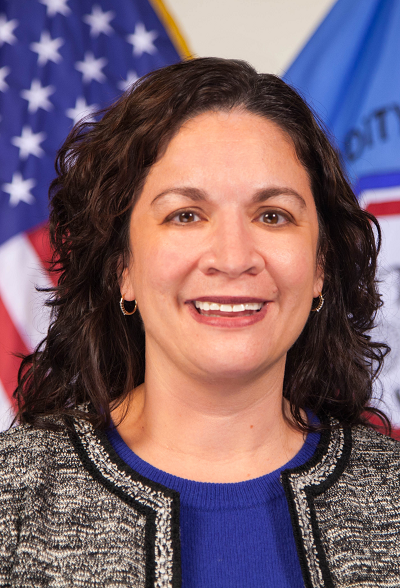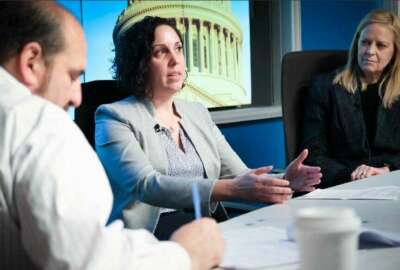
LabCFTC proving financial regulatory sector and innovation is not an oxymoron
Melissa Netram, the chief innovation officer of the Commodity Futures Trading Commission and the director of LabCFTC, said the lab is taking a multi-pronged app...
Just over a year ago, the Commodity Futures Trading Commission separated its innovation lab from its general counsel’s office.
LabCFTC now answers directly to the chairman of the commission.
Melissa Netram, the chief innovation officer of the Commodity Futures Trading Commission and the director of LabCFTC, said the lab is taking a multi-pronged approach to finding and promoting innovation in the financial sector starting with the final of a three-part virtual event called Empower Innovation 2020 event that kicked off Nov. 17 with a series of panels and speakers from government and industry.

Netram said the focus is on innovation at the Federal Reserve Board, the Treasury Department and law enforcement experts talking about crypto currency.
“The government mindset is not the same as an innovation mindset and that’s important. In the government, we can’t launch a project and have it fail,” Netram said on Ask the CIO. “We have a number of things we have to take into play before we launch or partner on a product. We will have a panel that talks about how they bring innovation to their everyday, how do they work with global government regulators as they help navigate what this innovation means, not only to their customers, but in some cases to their employees, especially in light of the pandemic.”
Netram said LabCFTC also will award the science prize competition at the event, which recognizes the innovator of the year for using artificial intelligence in the financial regulatory sector.
LabCFTC held two other related events in September and October focused on related but different topics and more than 200 people attended the event.
The Empower Innovation 2020 event is part of how the LabCFTC, and the commission more broadly, is helping to lead an innovation surge across the financial regulatory sector.
The CFTC joins a growing number of regulators across government that either has an innovation office or an innovation agenda. Netram said this is the first time all agencies that oversee the regulatory sector have focused on bringing technology advancements to a sector that traditionally has been slow to change.
“That is a big step to show that regulators are working to say, ‘hey, listen, the financial services industry is not as traditional as it’s been,’ so how do innovators work in this traditional space but also how do we adjust our traditional space to account for what the changing future is,” she said. “There are a number of states that have innovation offices that we work very closely with as well. Globally, we are part of an organization called the Global Financial Innovation Network, which is comprised of 50-plus regulators around the globe who have innovation offices like mine and meet on a pretty regular basis to collaborate on what we are learning, what we are seeing, how financial innovation is working in their geography and whether or not they are doing regulatory changes to adjust.”
Goals to promote innovation
The commission established LabCFTC in 2017, it has three full-time employees and hopes to add a fourth person soon. Netram said the decision to move LabCFTC out of the general counsel’s office came back to a simple message the chairman Heath Tarbert wanted to send to the agency and its external customers.
“We wanted to make a statement that innovation is important, especially in this space, and also to help promote innovation within the commission,” she said. “LabCFTC has few goals to promote responsible innovation. First and foremost, one of the reasons we were elevated is to help advance policy. One of the things we do is work with innovators and stay on top of the latest technology and bring it back internally to educate regulators and also inform as to what may be coming down the pike. The second piece is engaging with innovators and technology companies to help them navigate what’s going on. The third is to advance and work closely with financial innovators around the globe.”
Netram said setting up these innovation offices helps navigate the traditional slow-moving financial regulatory sector.
“Changing a mindset doesn’t happen overnight. It really has to be a culture shift. The past year of having that coordination at the senior staff level and being able to work closely with other divisions as they are implementing new policy or as they are moving forward with new initiatives and bringing that innovation mindset to the discussion is part of the role,” she said. “The second part is our office hours and enabling innovators to come in and talk to us. We are clear and transparent about what we can and can’t say, but also clear and transparent across the commission about who is coming in, what did we learn and what can we take away from what’s coming down the pike. The last, but definitely not least, is the education piece. It can’t simply be the innovation office that only knows the new technology, it has to be everyone across the board. One of the values of the pandemic is people were able to take some time to focus on their own training and their own education initiatives.”
Educating innovators, employees
Netram added that LabCFTC has done more than 60 training sessions on new and emerging technologies like blockchain, Bitcoin, Ethereum, and why cybersecurity is important.
“We’ve seen a lot of folks come through our door to talk about what they are doing related to blockchain, and since the pandemic we have had a lot of folks come through the door to talk about the tools they are providing for our market participants and engaging in that,” she said. “I see this as the next big area, but not so much blockchain as much as the digital assets, which are the cryptocurrencies based off the blockchain. That is an area the CFTC will be focusing on in the coming years. How do digital assets touch our regulatory environments? Right now it’s not certain whether things are securities or commodities in the U.S.”
Another innovation area LabCFTC is analyzing is decentralized finance, which is the when there isn’t one central space controlling the financial services structure. She said regulators will have to focus on how it works and whether it should be registered, and if so, how — because there isn’t a single point of failure.
“If something were to happen, it’s easy for us to point to X company or Y company and say, ‘this isn’t working, you need to shut it down because it’s hurting investors,’ or if we need to work with them to improve it,” Netram said. “In a decentralized environment, that is not as easy to do.”
Netram said her priorities in 2021 include working with newly formed CFTC offices focused on data and technology to emphasis the focus that data is key to everything the commission does.
Copyright © 2024 Federal News Network. All rights reserved. This website is not intended for users located within the European Economic Area.
Jason Miller is executive editor of Federal News Network and directs news coverage on the people, policy and programs of the federal government.
Follow @jmillerWFED






